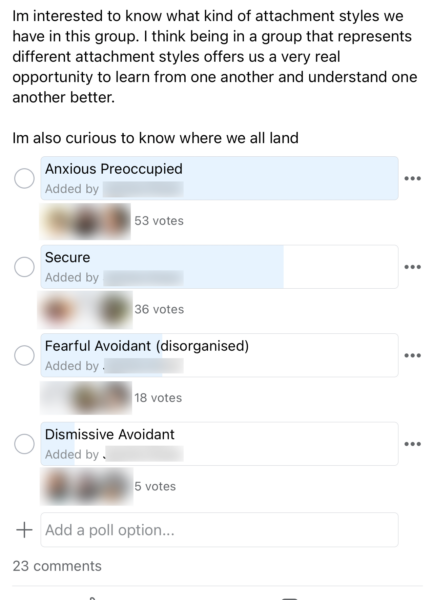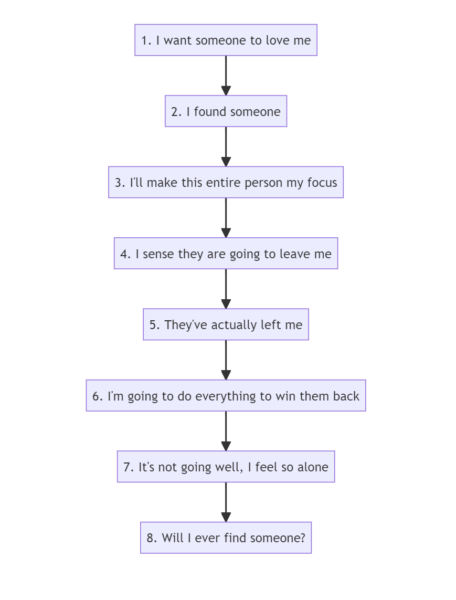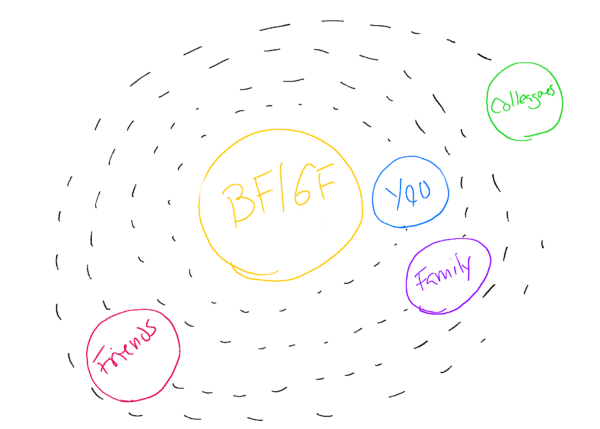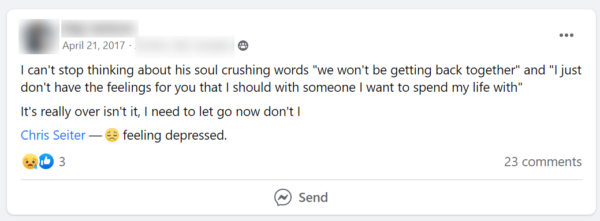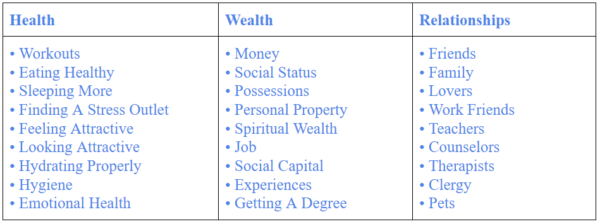Today we’re going to do a deep dive into how codependents act after a breakup.
In all I believe there are 8 core behaviors you can expect a codependent to exhibit after a breakup,
- Intense Grief
- Difficulty Letting Go
- Self Blame
- Going Through An Identity Crisis
- Obsession
- Neglecting Self Care
- Seeking Validation
- Unhealthy Coping Mechanisms
I think we should just jump right into it.

What Are Your Chances of Getting Your Ex Boyfriend Back?
Take the quizCodependent Behavior #1: Intense Grief
This shouldn’t come as a shock to anyone. After all, someone who is a codpendent often views relationships as the things that “complete them.” This was actually pointed out to me by Julia Kristina, a psychologist from Canada, in a recent interview I did with her,
The intense grief felt by a codependent individual post-breakup can encompass a deep and overwhelming sense of loss, often coupled with various other strong emotions.
Generally you’ll find that there are three emotional symptoms that a codpendent will go through on the outset of a breakup,
- Deep Sadness: A persistent, profound sadness that might feel bottomless. They may cry frequently and feel a pervasive heaviness in their chest.
- Despair and Hopelessness: They might experience a loss of hope, feeling like they’ll never find happiness or love again.
- Anger and Resentment: Besides sadness, they might also feel intense anger and resentment, sometimes towards themselves for perceived failures in the relationship.
Codependent Behavior #2: Difficulty Letting Go:
It’s no secret that most individuals who are codependents have an anxious attachment styles.
It just so happens that most of our clients have anxious attachment styles,
That means they usually go through these eight stages,
So, when I say I’ve seen firsthand how codependents have a difficult time letting go I really mean it.
Codependents often have a hard time letting go of exes post-breakup because their sense of self-worth and identity becomes intricately woven into the fabric of the relationship.
This merging of selves means that a breakup feels like losing a part of themselves, causing an overwhelming fear of abandonment and isolation to surface.
Their nurturing and caregiving instincts, developed to an excessive degree, might further tie them to the past, as they continually worry about the wellbeing of their ex-partner.
One of the things I’ve really noticed is that someone with a codependent nature doesn’t feel like the world is “righted” until they can get their ex back and so they treat that ex like a dog with a bone.
They won’t let it go.
Of course, it usually never initially works out right away which causes them to blame themselves
Codependent Behavior #3: Self Blame And Guilt
Codependents often have deep-seated issues with self-worth, which can lead to a tendency to shoulder an undue amount of responsibility for the successes and failures of the relationship.
This characteristic stems from their innate desire to care for and please their partner, sometimes at the expense of their own needs and happiness.
After a breakup, this tendency may translate into an overwhelming sense of self-blame and guilt, as they scrutinize their actions and behaviors, magnifying their perceived shortcomings and mistakes.
They might believe that they could have saved the relationship if only they had been “better” or “more” in some way.

What Are Your Chances of Getting Your Ex Boyfriend Back?
Take the quizThis cycle of self-blame and guilt can be a self-punishing process, where they deny themselves the compassion and understanding they readily offer to others.
Just take a look at that graphic I attached above,
Look at stages seven and eight.
That’s all about self blame.
“Why is this always happening to me.”
“It’s my fault.”
All of these negative perceptions usually aren’t true and only end up harboring this deep-seated belief that they are not worthy of love and affection, which gets seemingly “confirmed” with the breakup, perpetuating a harmful cycle of guilt and diminished self-worth.
Codependent Behavior #4: Identity Crisis
The one graphic that I constantly use when it comes to codependents is this beauty,
Basically I try to show people the danger of having their own “personal solar system” revolving around an ex because this is often how a codependent views relationships.
Their entire identity is wrapped up in this one person.
During a breakup, codependents often face a profound identity crisis, stemming from the deep-seated intertwining of their sense of self with their partner’s identity.
For a long time, their personal desires, preferences, and even aspirations may have been subsumed under the overwhelming need to accommodate and nurture their partner.
As the relationship ends, they suddenly find themselves untethered, without a clear anchor to define who they are. This loss of identity can manifest as a pervasive feeling of emptiness and confusion, as they grapple to rediscover their individuality separate from their roles in the relationship. The journey to reclaim their identity is usually marked by a series of self-doubts and hesitations, a precarious walk on the tightrope of rediscovery.
Their habitual patterns of seeking validation and defining their worth through the relationship leaves a void, making the process of forming a self-sufficient and distinct identity a complex and critical component of their healing journey.
Codependent Behavior #5: Obsession
One look at our community is enough to tell you this exists,
I can’t stop thinking about his soul crushing words “we won’t be getting back together” and “I just don’t have the feelings for you that I should with someone I want to spend my life with”
It’s really over isn’t it, I need to let go now don’t I
In the aftermath of a breakup, codependents might find themselves ensnared in an obsessive cycle where thoughts and memories of their ex-partner dominate their mental landscape.
This obsession can stem from their deep-rooted fear of abandonment and the void left by the severed emotional tether that once defined their existence.
Unable to detach,
- They may incessantly replay past conversations (see above example)
- Analyze minute details of the relationship
- Imagine scenarios where they might reunite.
This preoccupation sometimes spills into their behavior, as they may find themselves constantly talking about their ex or even stalking their social media profiles, unable to create a necessary distance.

What Are Your Chances of Getting Your Ex Boyfriend Back?
Take the quizCodependent Behavior #6: Neglecting Self Care
With this one I’d actually like to talk about the synergistic aspect of the trinity.
If you aren’t familiar I’m famous for talking about my “holy trinity,”
Basically you divide your life up into three categories,
- Health
- Wealth
- Relationships
The goal after a breakup is about balancing those three areas out. However, someone who is a codependent will neglect this basic self care. Worse, they’ll let it spiral out of control.
- They go through a breakup (negative impact on relationships)
- As a result of that breakup their work suffers and they get yelled at by their boss (negative impact on wealth)
- This depresses them and they decide to stop going to gym or treat themselves to an ice cream to “feel better” (negative impact on health)
And that’s just one small example. Imagine hundreds of these small examples spiraling out of control and creating an avalanche of sadness. That’s what often happens to codependents after a breakup.
Codependent Behavior #7: Seeking Validation:
After a breakup, codependents may embark on an arduous quest for validation, which at times can border on the desperate.
This period is characterized by an intensified need to feel seen, loved, and appreciated, as they attempt to fill the gaping void left by their former partner.
What’s interesting is that this search for validation might drive them to develop sudden interests or hobbies that mirror those of their peer groups or potential new partners, as they unconsciously try to mold themselves into an image that they believe would be more “lovable” or “acceptable”.
This chameleon-like behavior is not merely an attempt to fit in, but a deeper cry for recognition and validation, to soothe the raw edges of their fractured self-esteem.
As they navigate through this phase, they may also exhibit a heightened sensitivity to the opinions and affirmations of others, finding temporary relief in external approval, yet never quite satisfying their deep-seated need for genuine self-acceptance and love.
Codependent Behavior #8: Using Substances To Cope
In the turbulent aftermath of a breakup, codependents might find themselves gravitating towards substances as a means to cope with the engulfing tide of emotions and the harsh void that presents itself.
This predilection arises from a dire need to numb the excruciating pain, quiet the relentless mind chatter, and momentarily escape the crushing weight of their perceived failures.
The use of substances can provide a fleeting sanctuary, a transient reprieve from their self-flagellating thoughts and the engulfing loneliness. In the depths of their turmoil, the immediate relief offered by substances can be irresistibly alluring, providing a semblance of solace in their chaotic inner world.
However, this coping mechanism is perilously deceptive, offering only ephemeral comfort while potentially spiraling into addiction, further entangling them in a web of self-destruction and deepening their cycle of dependency and despair.
